By: Dr. Hayu Prabowo, Chair of the Institute for Environmental & Natural Resources Breeding of the Indonesian Ulema Council (LPLH & SDA MUI)
Qurban or Sacrifice is a very great act of worship because it has the meaning of improving relationships with God and relationships with fellow human beings.
Besides that, Islam also teaches how humans as Khalifatullah fil ardl are also given the mandate and responsibility to maintain and prosper the earth and all its contents.
Islamic teachings are very rich in instructions on how we should relate to nature or the earth that was created for the benefit of humans.
Also Read: Be Careful of the Trap of Deploying Peacekeeping Forces to Gaza
In the context of environmentally friendly qurban (Ecoqurban), there are several things that we need to pay attention to, namely the problem of single-use plastic waste, animal welfare and animal sacrifice.
Disposable Plastic Trash
Indonesia as the largest Muslim country in the world, will soon welcome the momentum of Eid al-Adha/Idul Kurban.
This great momentum is also an opportunity for Muslims to perform the sunnah worship of sacrificing.
Also Read: The Forty-Four-Days of Glory: Azerbaijan’s Struggle for Justice and Peace
Based on data from the Ministry of Agriculture in 2022, the estimated number of Sacrificial Animal Consumption in 2022 is 1,814,403 sacrificial animals consisting of Goats, Cows, Sheep and Buffaloes.
Based on these data, if in practice there are still many parties who use single-use plastic bags for the distribution of sacrificial meat to the community, it is estimated that it will generate 124,265,950 pieces of plastic bag waste (KLHK, 2022).
This number is not a small amount considering the problem of plastic waste in Indonesia continues to increase.
The polemic of the waste problem in Indonesia is still emerging. At the end of 2021, according to Greenpeace Indonesia, they found microplastic content in springs in Indonesia.
Also Read: Palestine Solidarity Month: A Collective Movement for Al-Aqsa and Palestine’s Freedom
The research conducted by the Indonesian Plastic Bag Diet Movement (GIDKP) with the Jakarta Provincial Environmental Service and Ecological Observation and Wetlands Conservation (Ecoton) also found microplastic and nanoplastic particles in the waters of DKI Jakarta.
In addition, there have been many discoveries of microplastics in the human body, ranging from the discovery of microplastics in human feces to the placenta and meconium in pregnant women, and recent research has also found nanoplastic particles in human blood and human lungs.
Seeing the increasing danger of single-use plastic waste, many parties ranging from stakeholders at the government level to the community have begun to realize the importance of changing behavior to reduce the use of single-use plastics and carrying out various initiatives to overcome the problem of single-use plastic waste upstream, especially waste, single-use plastic bags.
The problem of waste and environmental damage, actually comes from the behavior of all of us as the main actors in the source of waste. This is where the religious approach can play a role in changing behavior according to religious guidance.
Also Read: Hassan al-Turabi: A Controversial Thinker from Sudan
MUI has stipulated Fatwa No. 47/2014 concerning Waste Management to Prevent Environmental Damage, where one of the legal provisions is that every Muslim is obliged to maintain a clean environment, utilize used goods for the benefit and avoid various diseases and acts of tabdzir and israf.
Tabdzir is wasting goods/wealth that can still be used according to syar’i provisions or general habits in society. Israf is an act of exaggeration, namely the use of goods/wealth exceeds their needs.
In addition, from a regulatory perspective, the Indonesian government through the Ministry of Environment and Forestry (KLHK) has issued a Circular Letter of the Minister of LHK Number: SE.4/MENLHK/PSLB3/PLB.2/6/2022 regarding the Implementation of Eid Al-Adha without Plastic Waste.
On the other hand, Dompet Dhuafa Volunteer and ‘Aisyiyah have also collaborated to mobilize a volunteer base, a recitation network and a mosque that organizes qurbani to work together in reducing single-use waste.
Also Read: Who Exactly is the RSF Group Shaking Sudan?
For this reason, several initiatives have been carried out by the community by replacing single-use plastic bags with organic materials that are easily biodegradable, for example leaves (banana leaves, teak leaves, coconut leaves, etc.), materials made of bamboo (besek), brongsong, bongsang, and other organic ingredients).
The use of organic packaging will prevent us from harm due to environmental pollution and the spread of microplastics and nanoplastics that poison living things, including humans.
Animal Welfare
We are commanded to do ihsan to everything. Animal Welfare (Kesrawan) in the slaughtering process must be carried out by reducing the level of pain and stress, because all slaughter processes have the potential to cause stress and pain in animals.
Also Read: The Two-State Solution (Palestine–Israel) in Historical Perspective
The Prophet sallallaahu ‘alaihi wa sallam said, “Verily, Allah commands to do good in all things. If you want to kill, then kill in a good way. If you want to slaughter, then slaughter in a good way. You should sharpen your knives and please the animal to be slaughtered.” (HR. Muslim). This can be broken down into five principles, including:
1) Free from hunger and thirst;
2) Free from discomfort;
3) Free from pain, injury, and disease;
Also Read: Enchanted by K-Dramas, Dragged into Slander: Time for Muslims to Rise!
4) Free from fear and stress, and
5) Free to express their natural behavior.
Animal welfare is not only beneficial for animal life, it is also beneficial for humans. Some of the benefits of animal welfare for humans include increasing compassion for humans which can minimize cruel treatment of animals.
Animal welfare will also improve work safety and facilitate work for workers who involve animals, because treating animals with compassion makes animals, especially slaughter animals, calm and not violent.
Also Read: Creating Opportunity and Avoiding Misery; Lesson Learn on Waste Recycling Issue
There are many references on the web that we can learn about how to treat the sacrificial animal when it is about to be slaughtered, drop the sacrificial animal, and the process of slaughtering it.
Sacrificial Animal Waste
There are still many people or committees who are confused about how to properly dispose of waste or body parts of sacrificial animals that are not used.
As a result, waste from sacrificial animals is often found dumped into rivers, and in some places, waste from sacrificial animals is found piling up after Eid al-Adha.
Also Read: Between the Treaty of Hudaybiyyah and Ceasefire in Gaza
Waste from sacrificial animals that is disposed of carelessly will cause inconvenience to the community because it causes odors and causes disease and contamination of e-coli bacteria in water sources and can even make victims of e-coli poisoning.
Of course, this is an act that we must avoid together. To overcome this, several mosques have prepared special septic tanks at the slaughterhouses or stored the waste to be used as compost.
The EcoQurban campaign seeks to increase the understanding and awareness of religious communities regarding the relevance of sacrificial worship to social and environmental issues, especially for the practice of reducing single-use plastic waste as sacrificial meat bags, handling qurban animal slaughtering waste and how we should behave with compassion for slaughtered animals or animal welfare.
Of course, this requires a transition to changes in both attitudes and operations in the implementation of qurban. For this reason, the EcoQurban campaign needs to be carried out regularly to increase public participation and the role of the community in carrying out environmentally friendly sacrificial activities to get our moral perfection. (T/RE1)
Also Read: Peace Cannot Be Achieved Without a Palestinian State
Mi’raj News Agency (MINA)
Dr. Hayu Prabowo currently also serves as the Head of the Department of Inter-Institutional Relations, Foreign Relations & Environment of the Indonesian Mosque Council (DMI).






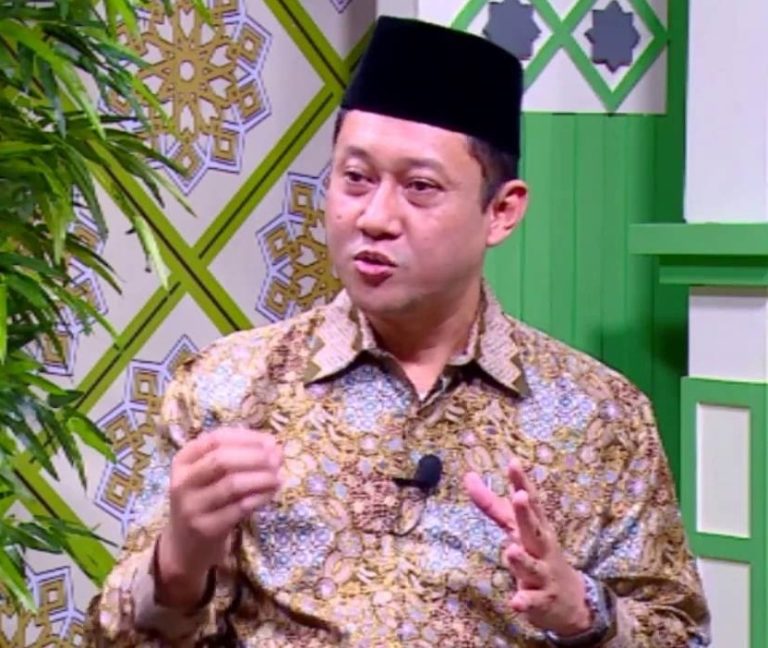


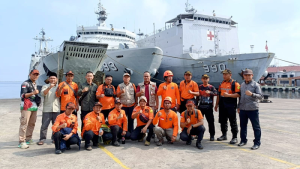

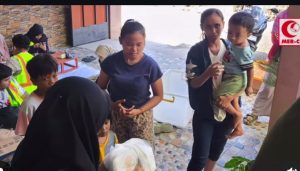



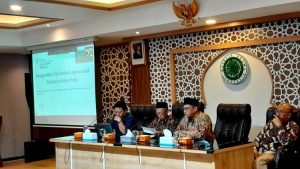
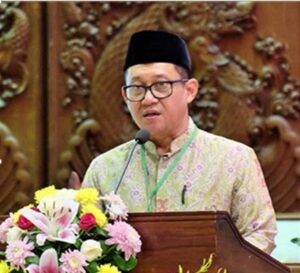
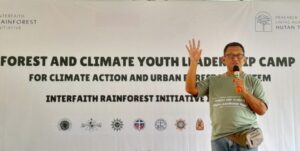
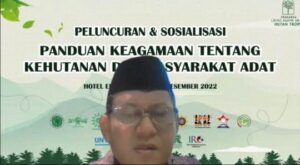













 Mina Indonesia
Mina Indonesia Mina Arabic
Mina Arabic